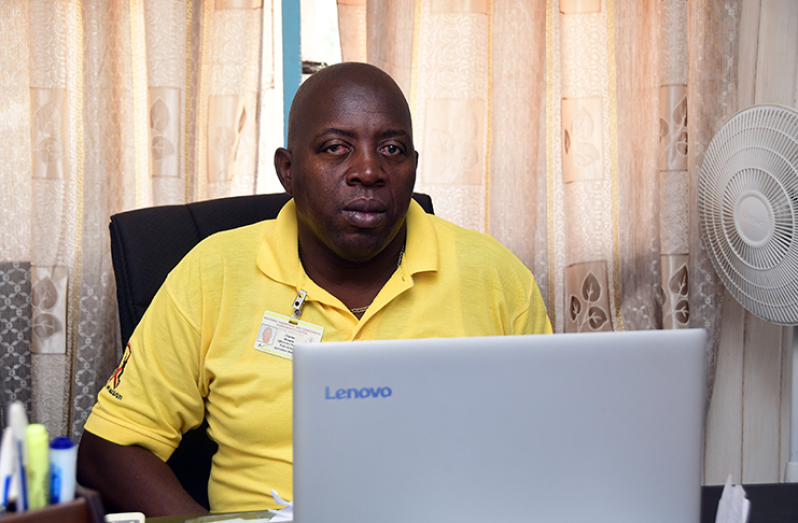…proposals for coconut processing plant, industrial park among initiatives in pipeline
By Tamaica Garnett
JUST OVER three years after the Wales Estate shuttered its doors, diversification plans are moving apace at the former sugar facility, where rice, cash crop, coconut, provision, citrus and animal farming are just a few of the industries that have already been established.
Though activities related to the diversification initiative were slow when the estate first closed in December 2016, it has since been seeing massive developments.
“It was a bit slow earlier but it is accelerating at this point in time, a lot of the people would’ve sent in their proposals to NICIL, they’ve been approved and they’re mobilizing,” noted Officer in Charge of the Wales Estate, Charles Browne.
The diversification is on course to see exponential growth over the next few years, with the plans on stream for the establishment of a fruit juice processing plant, a cold storage facility, a coconut processing plant and an oil and gas shore-based fabrication facility.
These will be established at a 200 acre plot that the estate already earmarked for an industrial park. Browne explained that the estate has already been given prerequisite permissions from the Environmental Protection Agency (EPA) and the area’s Neighbourhood Democratic Council (NDC) to move ahead with the initiative.
Following the ceasing of sugar production at the estate, it was handed over to the National Industrial and Commercial Investment Limited (NICIL) from the Guyana Sugar Corporation (GuySuCo), under their Special Purpose Unit.
The Unit set about privatising the operations, leasing the estate’s 8,352 acres of land to small, medium and large scale investors, mainly farmers. Many of the farmers are former sugar workers of the estate.
Rajkumar Outar is one of the large scale investors, who has invested in coconut farming. An exporter of de-husked coconut, which he bought from other farmers, Outar jumped at the opportunity to open his own farm. He leased almost 800 acres at the estate.
“With our plantation we will have better quality, and better control. I have machines working there at present. I have some coconuts on the land for preparation of a nursery. I’m doing this in phases, and I’m expecting that within two years the entire area will be cultivated,” Outar explained.
Under his business Rayo Trades Incorporated, Outar says he has some six years in the coconut industry and considers his business one of the biggest exporters of de-husked coconuts from Guyana.
“I export between 150 – 200 containers per year, principally to Dominican Republic and a small amount to Trinidad,” he shared.
Though his immediate focus is to get the farm at full capacity, in the not too distant future, he will be looking towards value-added items with the production of coconut derivatives.
Outar is one of two large-scale investors at the estate who will be involved in the coconut industry. Extra Virgin, a transnational company from the Caribbean region, has leased another 679 acres that they are developing into water coconut farming.
Before leasing land businesses had to submit proposals on their intended investments in the lands. The lands are being leased at $8500 per acre, with large scale investors being those leasing 200 or more acres.
Small scale investors are those leasing between 10 – 50 acres, while medium scale investors can lease between 50 – 200 acres.
The businesses are allowed to develop their investments incrementally, with the obligation that they develop at least 20 percent of their lands per year, full capacity therefore being expected within 5 years.
Aside from NICIL, popular West Bank Demerara rice farmer Deo Rupee and TST Kai, a company, have also privately invested in rice cultivation, and recently reaped their first crops. TST Kai has approximately 800 acres, and harvested roughly 117 acres at their last crop averaging approximately 40 bags per acre.
Rupee has almost 500 acres, and harvested approximately 200 acres averaging 35 – 40 bags per acre.
“I commenced working on the lands in April of last year and was able to convert a couple acres of the cane fields into rice, the yield was good,” Rupee shared.
He further noted that getting market for the rice was no hassle, saying: “Market is never a problem in this country for rice farmers, you sell it yourself or sell it to the mills. I don’t have challenges, I challenge. The land is there and I work the lands and that is it. I just make sure I get it done. I make it happen I don’t allow it to happen to me.”
Rupee will not be dedicating his entire plot to rice farming.
“I’ll be expanding [the rice cultivation] a little more but I have diversified my efforts from rice, to livestock with well over 100 head of cattle, sheep and goats, and I’m looking forward to expand to accommodate another set of swine and ducks. I also have plans to do aquaculture,” he related.
He is also farming citrus and ground provision.



.jpg)








